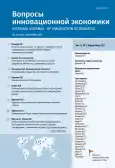The role of universities in the innovative development of Russian business
- Авторлар: Serebrennikov S.S.1, Ivanova N.M.1, Orlov M.A.1
-
Мекемелер:
- RANEPA
- Шығарылым: Том 13, № 1 (2023)
- Беттер: 439-452
- Бөлім: Articles
- URL: https://bakhtiniada.ru/2222-0372/article/view/146752
- DOI: https://doi.org/10.18334/vinec.13.1.117032
- ID: 146752
Дәйексөз келтіру
Аннотация
Негізгі сөздер
Авторлар туралы
Sergey Serebrennikov
RANEPA
Email: serebrennikov-ss@ranepa.ru
заведующий кафедрой теории и систем отраслевого управления, доктор экономических наук, профессор
Natalya Ivanova
RANEPA
Email: ivanova-nm@ranepa.ru
старший преподаватель кафедры теории и систем отраслевого управления
Mikhail Orlov
RANEPA
Email: orlov-ma@ranepa.ru
Доцент кафедры теории и систем отраслевого управления, кандидат экономических наук
Әдебиет тізімі
- Richter A. Locked-down digital work // International Journal of Information Management. – 2020. – p. 102157.
- Блохина М. С. Инновационные компетенции в структуре требований к современным руководителям // Вестник Нижегородского университета им. НИ Лобачевского. Серия: социальные науки. – 2016. – № 2 (42). – c. 149-158.
- О Стратегии развития информационного общества в Российской Федерации на 2017-2030 годы: Указ Президента РФ от 09.05.2017 № 203. [Электронный ресурс]. URL: http://www.kremlin.ru/acts/bank/41919 (дата обращения: 23.12.2022).
- Conceição P. Beyond the digital economy: A perspective on innovation for the learning society // Technological Forecasting and Social Change. – 2001. – № 2-3. – p. 115-142.
- Koutroumpis P. The economic impact of broadband on growth: A simultaneous approach // Telecommunications Policy. – 2009. – № 9. – p. 471-485.
- Czernich N. Broadband infrastructure and economic growth // The Economic Journal. – 2011. – № 552. – p. 505-532.
- Kongaut C., Bohlin E. Impact of broadband speed on economic outputs: An empirical study of OECD countries // Economics and Business Review. – 2017. – № 2. – p. 12-32.
- Van Dijk J., Hacker K. The digital divide as a complex and dynamic phenomenon // The information society. – 2003. – № 4. – p. 315-326.
- UNCTAD. Catching technological waves: Innovation with equity. Technology and innovation report 2021// United Nations publication – 2021
- IMD W. IMD World Digital Competitiveness Ranking 2021. [Электронный ресурс]. URL: https://www.imd.org/centers/world-competitiveness-center/rankings/world-digital-competitiveness (дата обращения: 23.12.2022).
- Янченко Е.В. Влияние цифровой экономики на инновационное развитие человеческого потенциала российского общества: возможности и ограничения // Вопросы инновационной экономики. – 2020. – № 2. – c. 849-866.
- Иванова Н. М., Орлов М. А. Инновационное развитие российского бизнеса в условиях пандемии COVID-19 // Вопросы инновационной экономики. – 2022. – № 2. – c. 771-784.
- Heinonen K., Strandvik T. Reframing service innovation: COVID-19 as a catalyst for imposed service innovation // Journal of Service Management. – 2020.
- Прохорова В. В., Схаплок Р. Б., Власов М. И. Адаптация организаций к неблагоприятной экономической ситуации, сложившейся в результате пандемии COVID-19 // Инновационная экономика: перспективы развития и совершенствования. – 2021. – № 3 (53). – c. 92-97.
- Kohtamäki M. The relationship between digitalization and servitization: The role of servitization in capturing the financial potential of digitalization // Technological Forecasting and Social Change. – 2020. – p. 119804.
- Zhou D. Exploring how digitalization influences incumbents in financial services: The role of entrepreneurial orientation, firm assets, and organizational legitimacy // Technological Forecasting and Social Change. – 2021. – p. 121120.
- Chae H. C., Koh C. E., Prybutok V. R. Information technology capability and firm performance: contradictory findings and their possible causes // MIS Quarterly. – 2014. – № 1. – p. 305-326.
- Carayannis E. G., Provance M. Measuring firm innovativeness: towards a composite innovation index built on firm innovative posture, propensity and performance attributes // International Journal. – 2008. – № 1. – p. 90-107.
- Серебренников С.С. Преодоление дисбалансов экономических систем в интересах укрепления их безопасности. - М.: Русайнс, 2021. – 87 c.
- Paul J. J. Graduates in the knowledge and innovation society // The flexible professional in the knowledge society. – 2011. – p. 11-137.
- Knabb S. D., Stoddard C. The quality of education, educational institutions, and cross‐country differences in human capital accumulation // Growth and Change. – 2005. – № 3. – p. 354-373.
- Kesting P., Ulhøi J. Employee‐driven innovation: extending the license to foster innovation // Management Decision. – 2010.
- Collins R. Collaborative circles: Friendship dynamics and creative work. – 2004
- Organisation for Economic Co-operation and Development. Knowledge management in the learning society. – OECD Publishing, 2000
Қосымша файлдар








